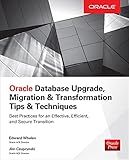Best Oracle XML to Varchar Conversion Tools to Buy in February 2026
To convert an XMLType data type to a VARCHAR data type in Oracle, you can use the getStringVal() method. This method returns the XMLType data as a VARCHAR value. Here is an example query that demonstrates how to convert an XMLType to a VARCHAR:
SELECT XMLColumn.getStringVal() AS VARCHARColumn FROM YourTableName;
Replace XMLColumn with the name of your XMLType column and YourTableName with the name of your table. This query will return the XML data stored in the XMLType column as a VARCHAR value.
What is the function for converting xmltype to text in Oracle?
The function for converting XMLType to text in Oracle is XMLType.getClobVal().
For example:
SELECT xml_column.getClobVal() AS xml_text FROM your_table;
How to convert xmltype to string in Oracle?
You can convert an XMLType to a string in Oracle by using the XMLSERIALIZE function. Here's an example:
SELECT XMLSERIALIZE(CONTENT your_xml_column AS CLOB) FROM your_table
Replace your_xml_column with the name of the XMLType column you want to convert to a string, and your_table with the name of the table containing the XMLType column.
The XMLSERIALIZE function converts the XMLType to a CLOB data type, which can be treated as a string in Oracle.
How to handle xmltype data in Oracle?
To handle XMLType data in Oracle, you can use various XML functions and methods provided by the Oracle XML DB. Here are some common ways to handle XMLType data in Oracle:
- Create an XMLType column: You can define a column in a table with the type XMLType to store XML data. For example, you can use the XMLType data type in the CREATE TABLE statement:
CREATE TABLE xml_data ( id NUMBER, xml_payload XMLType );
- Insert XML data into a table: You can insert XML data into a table by using the XMLType constructor or the XMLType method createXML. For example:
INSERT INTO xml_data (id, xml_payload) VALUES ( 1, XMLType('Oracle XML') );
- Query XML data: You can query XML data in a table using XPath expressions and XML functions. For example, you can extract values from XML data using the extractValue function:
SELECT xml_payload.extract('//title/text()').getStringVal() AS title FROM xml_data WHERE id = 1;
- Update XML data: You can update XML data in a table using XML methods and functions. For example, you can update XML data by modifying specific elements or attributes using the updateXML function:
UPDATE xml_data SET xml_payload = xml_payload.updateXML('/book/title', 'New Title') WHERE id = 1;
- Delete XML data: You can delete XML data in a table using the XMLType method deleteXML. For example, you can remove specific elements or attributes from XML data using the deleteXML function:
UPDATE xml_data SET xml_payload = xml_payload.deleteXML('/book/title') WHERE id = 1;
These are some common ways to handle XMLType data in Oracle. By using XML functions and methods provided by Oracle XML DB, you can store, query, update, and delete XML data effectively in your Oracle database.
What is the purpose of converting xmltype to varchar in Oracle?
The purpose of converting an XMLType to a VARCHAR in Oracle is to enable easier manipulation and querying of XML data. By converting XML data to a VARCHAR format, it can be more easily interpreted and processed using standard SQL techniques. This conversion allows for easier extraction of specific data elements from the XML document, and can facilitate integration with other non-XML data types and systems.
How to retrieve xmltype content as varchar in Oracle?
To retrieve the XMLType content as a VARCHAR in Oracle, you can use the following SQL query:
SELECT XMLTYPE_COLUMN.getClobVal() AS xml_content FROM YOUR_TABLE;
Replace XMLTYPE_COLUMN with the name of the XMLType column in your table and YOUR_TABLE with the name of your table.
By using the getClobVal() method, you can retrieve the XMLType content as a VARCHAR.
How to extract specific elements from xmltype in Oracle?
To extract specific elements from an XMLType in Oracle, you can use XPath expressions along with the extractValue() function. Here is an example of how to extract specific elements from an XMLType in Oracle:
- First, you need to convert the XML data into an XMLType object using the XMLType() constructor. For example:
DECLARE xml_data XMLType; BEGIN xml_data := XMLType('Harry PotterJ.K. Rowling'); END;
- Once you have the XML data stored as an XMLType object, you can use the extractValue() function to extract specific elements using XPath expressions. For example, to extract the title of the book from the XML data:
SELECT XMLType('Harry PotterJ.K. Rowling').extractValue('/bookstore/book/title') AS BookTitle FROM dual;
- You can also use the extract() method to extract specific elements as XMLType objects. For example, to extract the author of the book from the XML data:
SELECT XMLType('Harry PotterJ.K. Rowling').extract('/bookstore/book/author/text()') AS Author FROM dual;
By using XPath expressions with the extractValue() and extract() functions, you can extract specific elements from an XMLType in Oracle.



